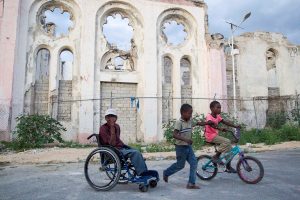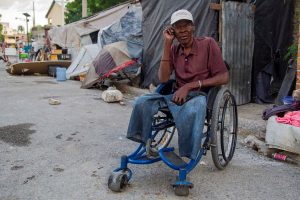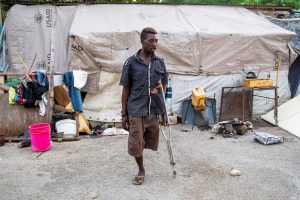By Milo Milfort

Port-au-Prince, Jan 10 (efe-epa).- Ten years later, Haiti still bears the scars from the powerful earthquake that struck the Caribbean nation on Jan. 12, 2010, killing 316,000 people and leaving survivors to deal with the physical and psychological trauma caused by the worst disaster in the country’s history.
Between 4,000 and 7,000 people underwent amputations following the magnitude-7.0 earthquake, which injured more than 350,000 people in the Western Hemisphere’s poorest nation.
The majority of amputees have had to deal with discrimination, as well as problems in obtaining basic services and jobs.
At a hot school in the heart of Port-au-Prince, Haiti’s capital, teacher Nirva Saint-Louis tells EFE about her long journey back to work after losing her left foot in the killer quake.

“Some students were able to escape after the first temblor. Two others and I didn’t. In the second temblor, the school’s roof collapsed on us. I spent the night in the rubble, I used my mobile phone to call my family so they could come and get me,” the teacher said.
After being pulled out of the rubble, Saint-Louis spent time at several hospitals, sought treatment abroad and ended up having to face the reality that her foot injuries worsened during the time she spent immobilized in a chair.
“After getting several negative (opinions), I finally agreed to the amputation,” Saint-Louis said, adding that with the help of relatives, health professionals and psychologists she finally accepted herself.
Saint-Louis’s case is rare in Haiti, a country where being an amputee has always carried a social stigma.
After the earthquake, this situation has worsened and, in many cases, discrimination has spread to include an amputee’s entire family and their socio-professional environment.

For amputees without an education, it is almost impossible to find a job and many of them have taken to the streets of Port-au-Prince since 2010 to beg for money from passersby.
Clinical psychologist Nathalie Coicou, a member of the Mental Health Initiative in Haiti (ISMA), said people who lived through the devastating earthquake went into a “state of acute stress” in the days following the disaster due to anxiety or in reaction to the great anguish they experienced.
“The Jan. 12 earthquake not only shook the ground, but it also changed the psychological-mental health situation in Haiti. The political leaders have become aware of the gaps that exist in terms of the national strategy, human, material and financial resources in the mental health area,” Coicou, who has experience working with victims after the earthquake, said.
Doctors Without Borders said Friday that in the first weeks after the earthquake, at least 40,000 people received psychological or psychiatric care from its specialists.
